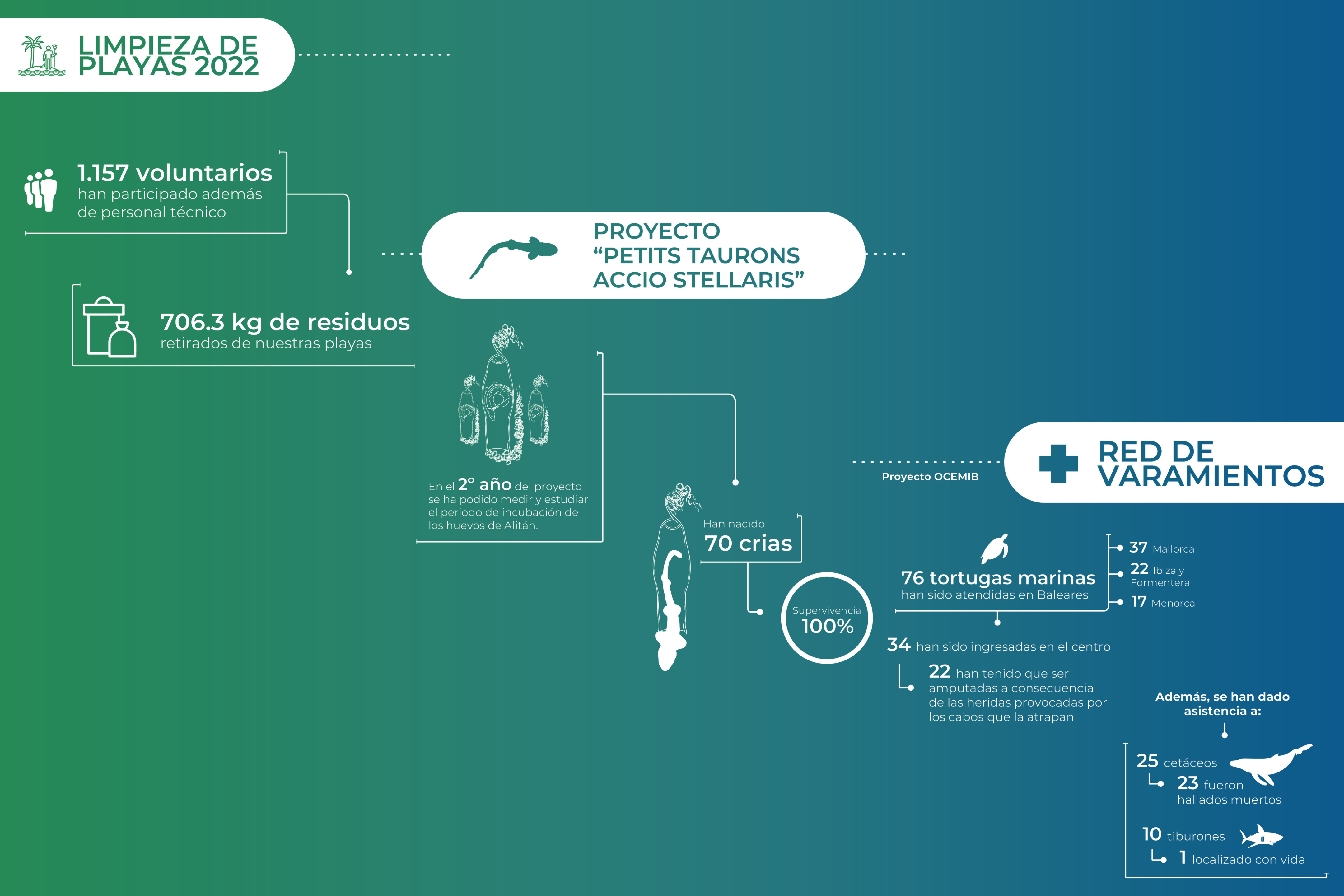During 2022 the aquarium has continued to work for and with marine conservation through projects, campaigns, environmental actions and the rescue of marine animals.
This year’s great efforts in conservation and research have focussed on the most vulnerable species, such as the catshark and the seahorse. But many environmental education campaigns have also been carried out as part of different projects and there has been active participation in actions and events within the marine environment theme.
Beach cleaning 2022:
During 2022, various beach cleaning campaigns have taken place in collaboration with companies like Coca Cola and through the action of Mares Circulares, La Caixa and FAN Mallorca.
This year, 20 beach cleans have taken place throughout the Balearic Islands in which some 1,157 volunteers have taken part, as well as technical staff, which always consists of 1 or 2 additional people for each clean.
A great task which entails cooperation, organisation and dedication from all those involved and the participants, who have managed to remove a total of 706.3 Kg of waste from our beaches.
Do you need help to organise your own beach cleaning activity? Contact the team here.
The “Petits Taurons – Accio Stellaris” Project
For the second year, the Palma Aquarium Foundation and the Department of Agriculture, Fishing and Environment have coordinated this project for the controlled breeding of the catshark(Scyliorhinus stellaris)within an artificial environment. This alliance has the participation of five private entities; Majorca Preservation Fund, Marilles, Palma Aquarium, PIM-Iniciatives per les Petites Illes de la Mediterrànea and Save The Med; as well as the collaboration of the fishermen’s guilds of Formentera and Cala Ratjada, who made it possible to have an initial stock of reproductive animals at the installations within Palma Aquarium, LIMIA and the aquarium at the Parque Nacional de Cabrera, where the first eggs have been obtained this year.
The project’s second year has focussed on measuring and studying the incubation period for the catshark eggs, which are kept in a tank with a stable temperature until they hatch. However, biological and ecological data, such as their growth rate, continues to be compiled.
In 2022, 70 catshark hatchlings were born with a survival rate of 100%. The prediction is that the largest ones can be introduced into their habitat very soon, when they reach an appropriate size (between 45 and 55 cm). The alliance is already evaluating locations for release and they estimate that they will be able to free the first hatchlings at the start of the year in the waters around Cabrera. This area is monitored by sensors and receivers with a range of 2 square km, which will enable the follow-up of these small sharks.
The catshark is a completely successful project which will allow the acquisition of knowledge, experience and design protocols for actions that can be used with other more vulnerable species requiring conservation in the future.
Rescue Centre:
The Rescue centre of the Palma Aquarium Foundation is a service managed by COFIB, which belongs to the species protection service of the Department of the Environment and Territory, and which, since last June has been acting under the framework of the conservation and protection project for threatened marine species (marine turtles, cetaceans and sharks) in the Balearic Islands, supported by the Biodiversity Foundation of the Department for Ecological Transition and the Demographic Challenge (MITECO), through the Recovery, Transformation and Resilience Plan (the PTCR plan)financed by funds from NextGenerationEU.
2022 has been an intense year in terms of rescues. A total of 76 marine turtles have been assisted in the Balearics: 37 in Mallorca, 22 in Ibiza and Formentera and 17 in Menorca. Of all of these, half were victims of becoming tangled in fishing nets.
Last year, 34 marine turtles were kept at the centre, of which 22 needed amputations due to injuries caused by the ropes that they were trapped in. Thanks to the efforts, dedication and professionality of the team of specialists and volunteers, 26 specimens recovered fully and were returned to their habitat.
The Rescue Centre has also assisted 25 cetaceans, 23 of which were found dead, and 10 sharks, of which only 1 was found alive.
This is a year in which, undoubtedly, the compiled data demonstrates the serious threats that the inhabitants of the Mediterranean have to face, and which reminds us that the fight against marine waste continues.
Apart from being a Rescue Centre for Mediterranean Marine Fauna, the Palma Aquarium Foundation is also a leader in conservation work, education and research. The annual assessment data speaks for itself, detailing another year of great work, effort and dedication from all the professionals, volunteers and collaborators who work with and for marine conservation through each project, campaign, environmental action and rescue.


 "
"
